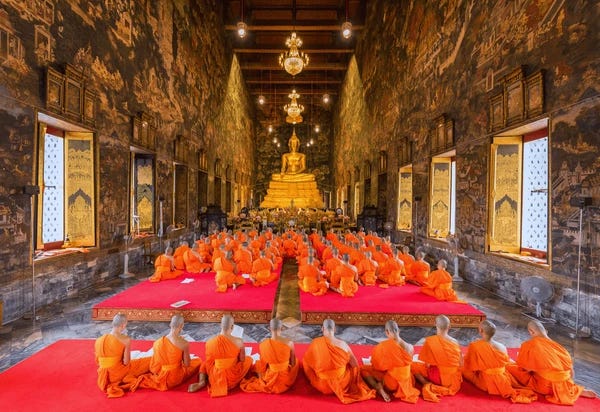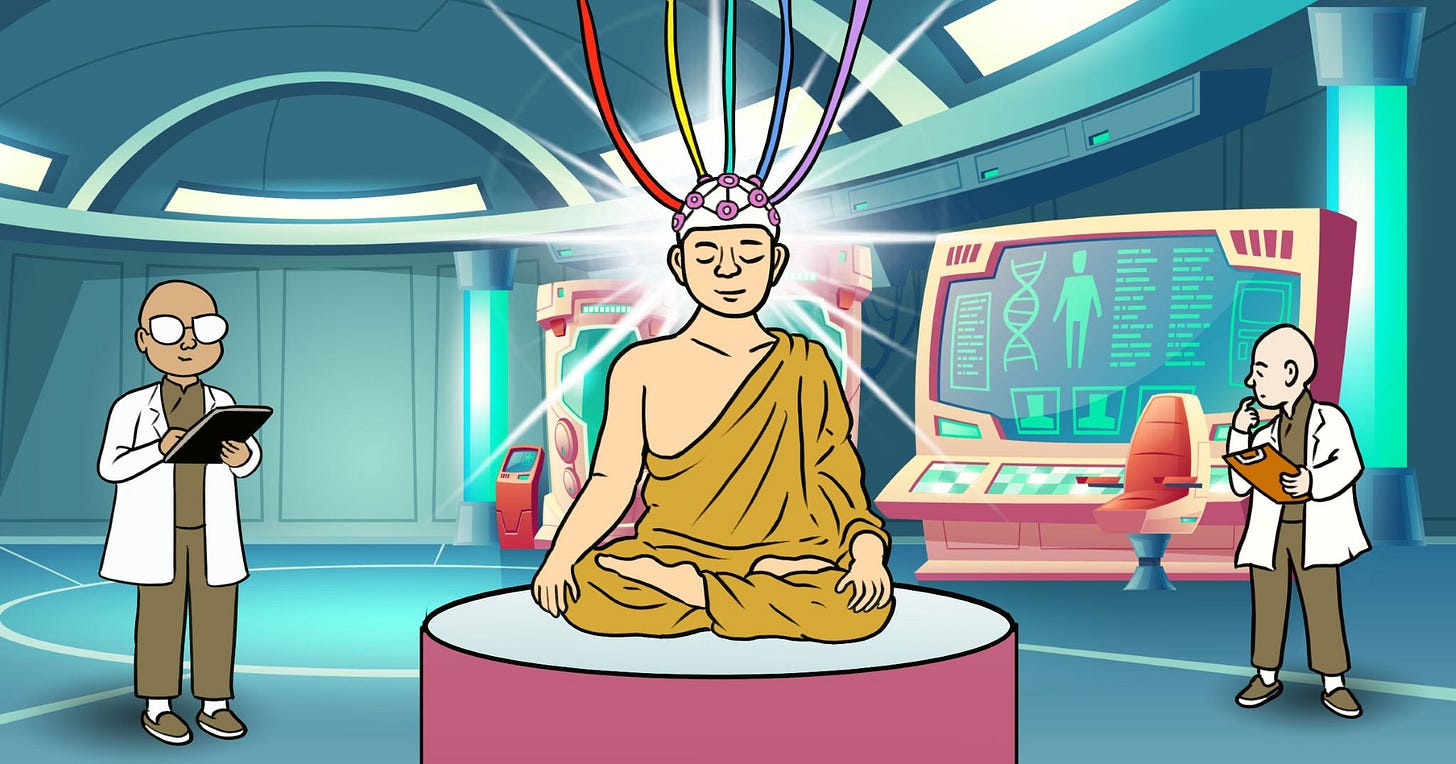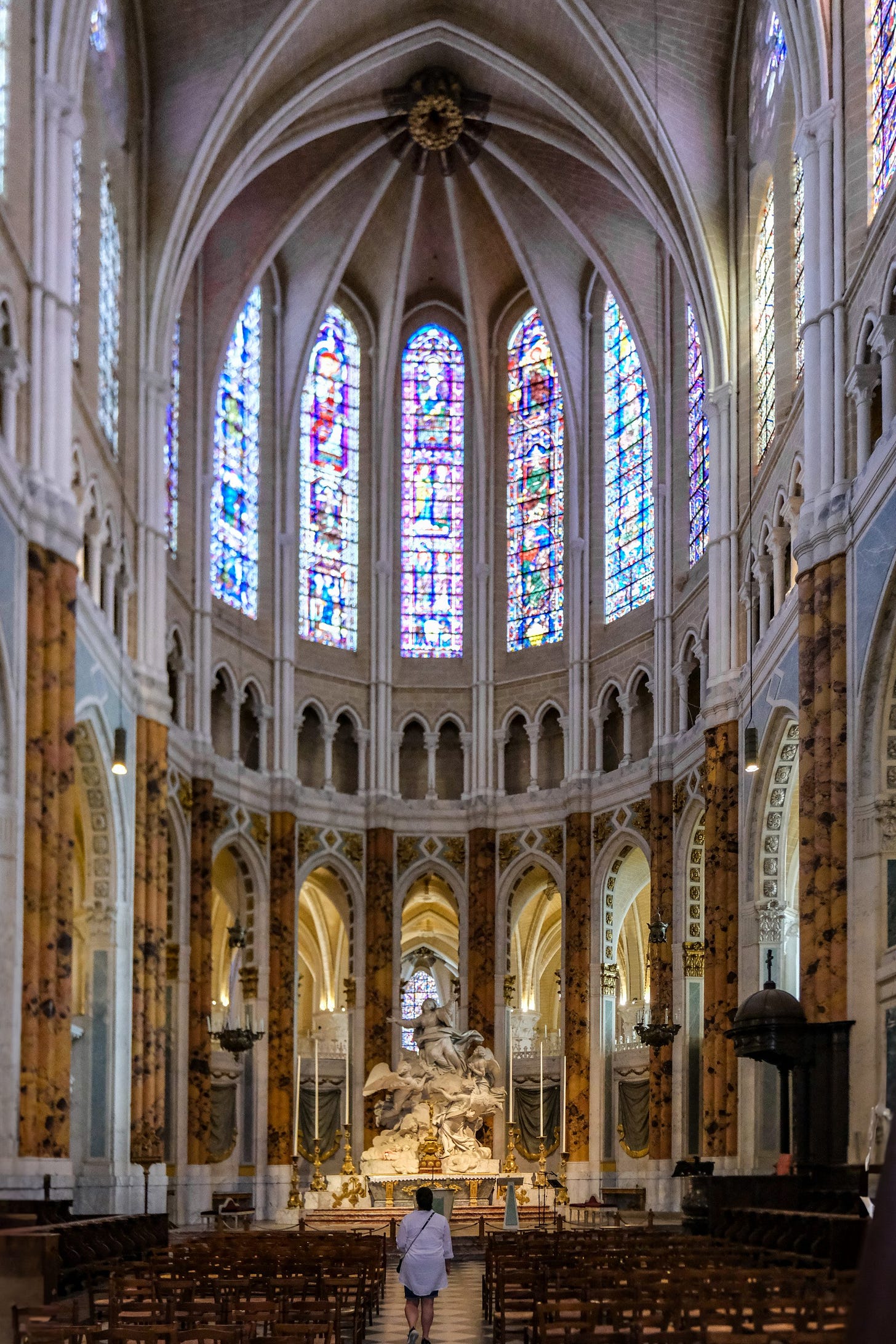Epistemic status: I haven't even read one sutra yet, lol
What do you picture when you think of Buddhism?
Do you picture something more like this:
Or something more like this:
In the West, most people would likely picture the first image. A nice, clean, well lit room with a bunch of soft pillows, a bohemian vibe, and maybe some cute little Buddha statues in the corner.
Unfortunately, "real" Buddhism does not have much similarity to that model. Unlike most Westerners believe, historical Buddhism has many of the trappings of any others religion - it's full of superstition, belief in gods, demons, magical powers, heavenly and not-so-heavenly realms, et cetera.
Buddhism in the West has undergone a sneaky transformation. A religion that, historically, was a radical path of self-negation has become something quite different.
Traditional Buddhism - Major Differences
I don't claim to be an expert on traditional Buddhism, but I have learned a few things via research. I'll be leaning heavily on this article from Vividness, so please check it out if you're curious to learn more.
The most glaring difference between Secularized Buddhism and it's traditional counterpart can be boiled down to one question: who can attain enlightenment?
In the Western world, it's taken almost as a given that everyone and anyone and their mother can attain enlightenment, in this life. You meditate to get better, and if you try hard, you'll become just like the Buddha someday!
Due to the fact that Secularized Buddhism necessarily only has one life, the early proponents of it probably saw this pivot as necessary. Unfortunately, Buddhists throughout history saw it quite differently.
If you asked a Buddhist in the 17th century in Asia who could achieve enlightenment, what would they say?
Well, unfortunately for most Buddhists in the West, they'd say that only the committed monk, who has taken vows and lives in the monastic sangha, even had a hope of attaining enlightenment in this life. The vast majority of those monks would also fail, and only attain enlightenment after dozens or even hundreds of further lives of purification, and dedication.
Due to the work of Buddhist evangelizing from figures like D.T Suzuki, Eckhart Tolle, Joseph Goldstein, and even the illustrious Thich Naht Hahn, Buddhism became increasingly separated from its traditional roots. Nibbana, which originally referred to an epic quest which took lifetimes to fulfill, a quest for supreme perfection, became recast the West as self-fulfillment or personal enlightenment. "Self-Actualization" to borrow the phrase from Maslow.
Many Buddhist reformers, like Thich Naht Hahn, even expanded the Buddhist remit to include society as a whole, looping in concepts like social justice under the idea of "engaged Buddhism."
This rebranding, while attractive, dilutes the profound challenge of Buddhism into something closer to “wellness culture,” where it sits comfortably alongside yoga routines and weekend diets. What gets lost is the true depth of its doctrine, which demands the sacrifice of self for transcendence and union with the divine.
The Only 'Scientific' Religion
A quick internet search reveals plenty of breathless articles from mainstream institutions claiming that Buddhism is the most scientific religion. Some of these articles even literally claim that Buddhism is more of a form of science, than a religion.
Part of why Buddhism took off and was able to out-compete the native religion of Christianity in the West, is that much Buddhist movement positioned itself as a “scientific” alternative to Christianity. Yet, to anyone who’s done their homework, Buddhism is filled with as many gods, demons, and rituals as any religion. (as an aside, if this is true then why did science emerge from Christianity and not Buddhism?)
Traditional Buddhist cosmology includes elaborate realms populated by gods, demigods, and demons—often drawing on the mythological landscape of early Indian, or Vedic, writings. Buddhists believe in a cycle of death and rebirth that determines one’s existence across lifetimes based on karma, the accumulated moral weight of one’s actions. Enlightenment, in this context, isn’t a simple self-help objective; it’s the ultimate liberation from these cycles, accessible only through rigorous adherence to moral discipline and monastic life.
Traditional Buddhist texts also describe supernatural powers attained by advanced practitioners, known as siddhis. These abilities, thought to include telepathy, levitation, and even shape-shifting, were accepted as part of a skilled meditator’s path to enlightenment. The Buddha himself, within canonical texts, interacts with a vast array of spiritual beings—from Mara, the demon king, who personifies death and temptation, to devas (gods) and yakshas (spirits). This otherworldly backdrop makes traditional Buddhism less a “science of the mind” and more a rich, mystical tradition with its own quite un-scientific cosmological framework.
Yet, in modern reinterpretations, much of this mysticism is downplayed or omitted entirely, replaced by a focus on mindfulness and mental wellness practices. This "secularized Buddhism" emphasizes personal fulfillment and psychological balance, steering away from the supernatural and metaphysical dimensions that define its original doctrines.
Ultimately, despite the secularization and rationalization of Buddhism in the West, traditional Buddhist practices and beliefs are deeply mystical. The historical tradition of Buddhism in the East certainly doesn’t line up with the Western values of scientific rationality and materialism.
Spirituality in the West
In the West, Buddhism has become something akin to a therapeutic toolkit—a secularized, softened version that many turn to for relief and focus. It’s often practiced in meditation centers and yoga studios where the emphasis is on mindfulness and personal well-being, stripped of the ritual and mystical depth that characterize traditional Buddhism. This Westernized version of the religion reinterprets concepts like enlightenment, reducing them to self-fulfillment or stress relief, and overlooks the profound dedication and self-renunciation required in the original teachings.
Real Buddhism, as it developed historically, is a deeply mystical path that emphasizes relinquishing the ego across multiple lifetimes and striving toward a distant enlightenment. Traditional Buddhists don’t expect enlightenment to come easily or in one lifetime, nor do they see it as simply improving one's quality of life. This process requires surrender, profound discipline, and often, withdrawal from worldly attachments. In the West, these teachings are often reduced to psychology or wellness, and the daunting challenge of enlightenment has become something closer to “personal development.”
In reality, the only reason that Buddhism could gain such a foothold in the West is because the native religion, Christianity, abandoned the mystical path of experiencing God in favor of dogma, and shaming those who abandoned it. Christianity failed to provide a place for serious spiritual seekers, so most of those who yearned to experience God in a personal sense turned to the East.
Unfortunately, this Western transformation of Buddhism has fostered a hollow version of spirituality that, just like Western Christianity, is out of sync with the real needs of the soul. The rational, secular mindset performed the same lobotomy on Buddhism that it achieved over centuries on the Christian spiritual path.
Modern mindfulness without true surrender can only go so far, and the secularized Buddhism most practice in the West lacks the transformative power found in the traditional path. In this watered-down approach, there is little space for the transcendence of self, the recognition of something greater, or the deep spiritual struggle that both Buddhism and other great spiritual traditions have long upheld.
For seekers who sense the lack of a connection with God in the West - all hope is not lost. We still do have an ancient traditional to fall back on, full of non-dual teachings, ways to reduce anxiety, and ultimately a larger mythopoetic worldview to center yourself in.
While the broader Christian culture may have failed to accommodate spiritual seekers, a religious revival is currently happening. Over time, I suspect mystical Christianity will see a large resurgence, or even, a resurrection. Only time will tell.








